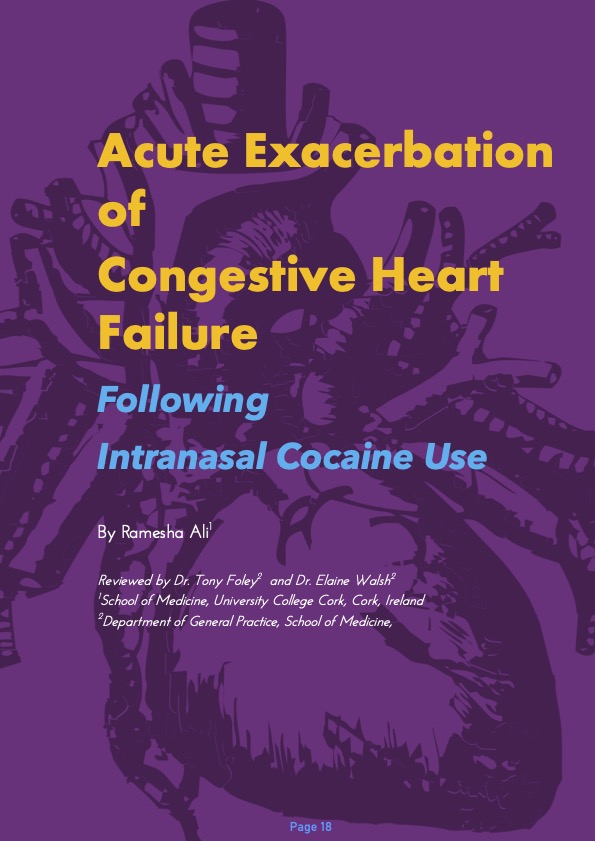Acute exacerbation of congestive heart failure following intranasal cocaine use
DOI:
https://doi.org/10.33178/SMJ.2019.1.2Keywords:
CHFAbstract
Background: Most presentations of decompensated congestive heart failure occur in patients diagnosed with pre-existing heart failure. Decompensation presents as progressive dyspnea, abdominal and peripheral congestions, as well as neurological symptoms. It typically occurs following physiological stressors such as infection, arrhythmia, or medical non-adherence. Chronic heart failure may result from cardiovascular comorbid conditions, such as coronary artery disease, valvular disease, and long-standing hypertension.
Long term cocaine use also results in adverse cardiovascular health. Cocaine use can augment pre-existing risk factors for both chronic congestive heart failure and acute decompensations - namely, coronary artery disease, congestive heart failure, and peripheral vascular disease. It can also independently pose a cardiovascular risk by causing acute ischemia, vasoconstriction, tachycardia, systolic dysfunction, and cardiac remodeling.
The Case: the case of a 49-year-old Caucasian male, who presented with worsening dyspnea on exertion and bilateral peripheral edema extending to his abdomen. His symptoms worsened over the preceding week and began after three consecutive days of intranasal cocaine use. He presented with a background history of congestive heart failure, coronary artery disease, peripheral vascular disease, a 30 pack-year smoking history, and weekly cocaine use for the past 12 years.
Conclusion: Cocaine use can lead to decompensation of congestive heart failure in patients with extensive cardiac and vascular disease. Cocaine use can also acutely worsen systolic function and cause demand ischemia, on a background of chronic remodelling and atherosclerotic changes.
Patient Consent Obtained: Yes
References
Fonarow GC. The Acute Decompensated Heart Failure National Registry (ADHERE): opportunities to improve care of patients hospitalized with acute decompensated heart failure. Reviews in cardiovascular medicine. 2003;4:S21-30.
Kim, S.T. and Park, T., 2019. Acute and chronic effects of cocaine on cardiovascular health. International journal of molecular sciences, 20(3), p.584.
Bui AL, Horwich TB, Fonarow GC. Epidemiology and risk profile of heart failure. Nature Reviews Cardiology. 2011 Jan;8(1):30.
Hajar R. Risk factors for coronary artery disease: historical perspectives. Heart views: the official journal of the Gulf Heart Association. 2017 Jul;18(3):109.
Kim ST, Park T. Acute and Chronic Effects of Cocaine on Cardiovascular Health. International journal of molecular sciences. 2019 Jan;20 (3):584.
Finlayson K, Wu ML, Edwards HE. Identifying risk factors and protective factors for venous leg ulcer recurrence using a theoretical approach: A longitudinal study. International journal of nursing studies. 2015 Jun 1;52(6):1042-51.
Yakusheva O, Costa DK, Weiss M. Patients negatively impacted by discontinuity of nursing care during acute hospitalization. Medical care. 2017 Apr 1;55(4):421-7.
Tammes P, Purdy S, Salisbury C, MacKichan F, Lasserson D, Morris RW. Continuity of primary care and emergency hospital admissions among older patients in England. The Annals of Family Medicine. 2017 Nov 1;15(6):515-22.

Downloads
Published
License
Copyright (c) 2024 Ramesha Ali

This work is licensed under a Creative Commons Attribution-NonCommercial 4.0 International License.









